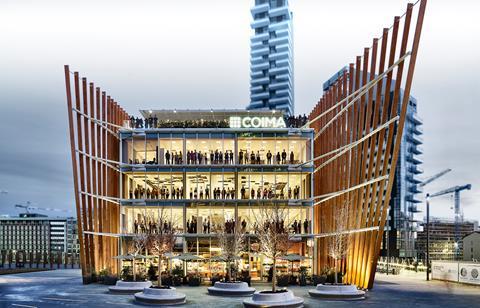
Overview
COIMA is the vertically integrated real estate manager with inhouse investment, development and property management capabilities, with ca. 300 people focused on delivering both ESG impact and financial returns. COIMA investors include leading sovereign wealth funds and institutional investors from Europe, United States, Middle East, Asia and Italy. Active for over 50 years in the Italian real estate market, its assets under management exceed EUR 13 bn, with over EUR 4.2 bn invested in the last five years.
COIMA Holding controls the Group’s operating companies, including COIMA SGR, an investment & asset management firm managing over 40 real estate investment funds; COIMA REM, a development and property management company with over 5 million square meters developed; COIMA HT, dedicated to the integration of technology into physical spaces; and COIMA Image, specialised in architectural and interior design.
Among its most important projects, COIMA has developed and manages the Porta Nuova neighbourhood in Milan, the first district in the world to obtain the LEED® and WELL® for Community sustainability certifications. COIMA is currently developing the residential and student housing component of the Porta Romana neighbourhood in Milan, including the Olympic Village for the Milano Cortina 2026 Winter Olympics.
Investment Principles & Strategy
COIMA’s investment strategy is driven by long-term value creation and ESG objectives, leveraging on market fundamentals and its vertically integrated platform to optimise risk-adjusted performance. The investment analysis is focused on:
- Economic and real estate cycles: Assessing real estate’s relative value based on past performance and forecasts of macro trends.
- Locations: Identifying prime and emerging locations through detailed mapping.
- Demand needs: Understanding the evolving end users’ requirements.
- Demand/supply gaps: Identifying market gaps for investment opportunities.
- Product development: Aligning product offerings with market demand.
- Sustainability performance: Enhancing ESG outcomes by mitigating sustainability risks and adding value to investments through the integration of key pre-defined objectives.
COIMA’s vertically integrated structure enhances the ability to identify, measure, and manage risks throughout the value chain.
Sector Forecasts
RESIDENTIAL / LIVING:
Residential demand in Italy has proven to be resilient with transactions levels exceeding historical averages. Milan especially, has experienced positive demographic trends, driven by Italians relocating from other cities as well as professionals and HNWIs from abroad, attracted by the favorable tax regime. Demand is focused on modern stock, which is lacking in the market, driving pre-sales levels in Milan and Rome to record highs. The significant demand and supply unbalance, creates investment opportunities not only in traditional residential for sale, but also in other living solutions, such as student housing and built to rent premises. This trend results in attractive opportunities for brown to green and conversion projects of obsolete assets into a modern living product.
INDUSTRIAL:
Retail e-commerce has become well-established, increasing the need for domestic and international companies to have logistics warehouses in Italy. The existing stock is limited and obsolete while the demand is focused on grade-A assets meeting sustainability and quality requirements. COIMA is focusing its investment strategy on both core and development-to-core strategies aimed at meeting international standards. COIMA believes the Italian logistics market offers an attractive opportunity, due to the favorable market yield spread to other comparable European countries, the relatively low rents and the strong fundamentals.
HOSPITALITY:
Tourist arrivals in Italy since the end of the pandemic have spiked and ADR growth of the key Italian touristic cities has been higher than those of other European peers. The growth has been especially strong in the luxury segment where the offering in Italy is limited due to low penetration from international chains and generally obsolete stock. Given Italy’s appeal as a premier travel destination and the demand and supply gap, COIMA believes there are strong fundamentals and an attractive investment opportunity.
OFFICE:
Demand has continued to polarize towards Grade A sustainable properties in central and well-connected locations, with tenants willing to consolidate in modern premises paying a higher rent per sqm and rationalizing spaces. Given the low availability of Grade A stock in Milan and Rome (the lowest among European peer cities), Grade A vacancy remains low and prime rents have increased well-above inflation. COIMA expects the demand polarization trend to continue driving prime rental growth which will ultimately result into capital values growth over the next years. Given the recent substantial correction in prices, COIMA believes 2025/26 to be an attractive vintage to enter the market with a brown to green strategy focused on prime locations in Milan and Rome.
RETAIL:
Investors mainly focusing on prime high street locations with strong tourism appeal and top-tier shopping centers, alongside opportunistic strategies for high-yielding out-of-town retail. As a consequence, in 2025 retail has recorded strong investment activity compared to previous years providing more liquidity and a stronger outlook for this asset class.
Strategic Corporate Development
COIMA’s strategy is built around four core pillars: ESG impact, digitalization, urban regeneration, and brown-to-green transition. The group operates through an integrated platform that combines industrial real estate capabilities and financial expertise, enhanced by advanced data analytics and automation. This enables a full-chain ESG approach — from acquisition and development to asset management — supported by continuous investment in people, technology, and innovation.
In line with the EU Sustainable Finance Disclosure Regulation (SFDR 2019/2088), COIMA SGR has adopted a ‘comply’ approach regarding principal adverse impacts, with a target of classifying 100% of assets under Article 8 by 2030.
COIMA’s climate strategy is aligned with EU and international frameworks, targeting a progressive phase-out of fossil fuels and full alignment of its portfolio with energy-efficient, low-carbon standards, consistent with the CRREM 2°C decarbonisation pathway for 2050.
As of today, COIMA is leading some of the largest and most strategic urban regeneration projects in Italy, including Porta Romana (Olympic Village), Valtellina/Farini, and MilanoSesto — the latter being one of the largest regeneration projects in Europe, embodying climate adaptation, inclusive urbanism, and sustainable innovation at scale.
ESG Performance Verification
COIMA’s investment strategy integrates sustainable investment objectives. To achieve them, COIMA has developed the proprietary “COIMA ESG Metrics”, a comprehensive performance and risk analysis tool, which aims to measure, monitor and report ESG outcomes at both Fund and Asset level. The tool leverages key indicators based on ESG parameters to ensure continuous monitoring of performance throughout each Fund’s lifecycle, identifying deviations from targets and maintaining a detailed archive of sustainability data, which also supports potential investment and divestment decisions.
COIMA’s commitment to Sustainable Investment is also reflected in its achievements in the Global Real Estate Sustainability Benchmark (GRESB). Since joining in 2018, COIMA has steadily improved its performance, and it is the only company globally to achieve Global Sector Leader recognition for 2025 for five of its investment funds in the GRESB Development non-listed Benchmark.
COMPLIANCE STATEMENT
In compliance with the Italian regulatory framework, the Company has established an internal Compliance Function. COIMA SGR designated a Chief Compliance Officer, who is in charge of ensuring that company is complying with all applicable laws, rules and regulations, as well as internal codes of conduct, policies and procedures. The Chief Compliance Officer is also Head of the AntiMoney laundering Function.














